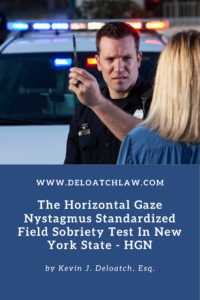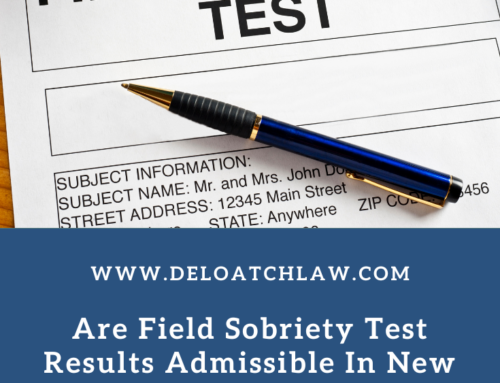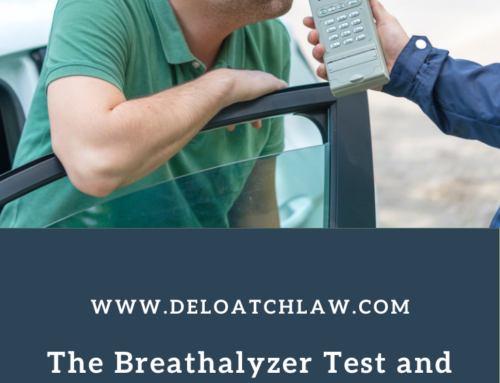Have you been arrested for driving under the influence (DUI) in New York state and asked to perform the Horizontal Gaze Nystagmus (HGN) standardized field sobriety test? What is the HGN and is the effect on your case?
Being arrested and charged with driving under the influence is an extremely stressful situation. If you are arrested in New York state for “drunk driving”, you will be charged under one or more of various subsections of Vehicle and Traffic Law (VTL) § 1192 – Operating a motor vehicle while under the influence of alcohol or drugs. Depending on the facts and circumstances of your arrest and your driving history, it means you could be facing anything from a loss of driving privileges to a substantial term of imprisonment if convicted. It can also be the difference between a violation, misdemeanor or a felony conviction.
Moreover, New York is an implied consent state, meaning that anyone stopped for suspected DUI is implied to have consented to a battery of field sobriety tests. The HGN is one of the many field sobriety tests that law enforcement in New York will administer on a driver suspected of being impaired and/or intoxicated. Refusal to take the tests can result in additional penalties from the Department of Motor Vehicles (DMV).
The Horizontal Gaze Nystagmus Standardized Field Sobriety Test
 The HGN is a standardized field sobriety test that law enforcement uses to determine if someone is impaired (i.e., under the influence of alcohol) and/or intoxicated. It is one of many standardized tests whose standards have been approved by the National Highway Traffic Safety Administration. In a nutshell, the HGN measures the involuntary jerking of the eyes (i.e., nystagmus) that occurs when someone has consumed and metabolized enough alcohol that it affects their muscular system. Just to be clear, the consumption of alcohol is not the only reason why a person may exhibit nystagmus. However, it is recognized as a cause of nystagmus.
The HGN is a standardized field sobriety test that law enforcement uses to determine if someone is impaired (i.e., under the influence of alcohol) and/or intoxicated. It is one of many standardized tests whose standards have been approved by the National Highway Traffic Safety Administration. In a nutshell, the HGN measures the involuntary jerking of the eyes (i.e., nystagmus) that occurs when someone has consumed and metabolized enough alcohol that it affects their muscular system. Just to be clear, the consumption of alcohol is not the only reason why a person may exhibit nystagmus. However, it is recognized as a cause of nystagmus.
In many jurisdictions, including New York state, the results/conclusions of the HGN test are admissible as evidence of intoxication only if the prosecution can provide a proper foundation for the reliability of the results. Thus, the prosecution has the burden of proving that the test was: 1) properly performed; and 2) by someone who was properly trained to administer the test.
The test is standardized and thus must be performed by following specific standardized procedures for the results to be reliable. If not performed in accordance with the standardized procedures, the results of the test are inadmissible as evidence by the prosecution. Indeed, in a notable case, People v. Hillman, 2019 NY Slip Op 51555 – NY: City Court 2019, the court determined:
[T]he results of the field sobriety tests are inadmissible because the People have failed to prove that they had been administered in a manner consistent with the “Concepts and Principles of the Standardized Field Sobriety Tests” manual promulgated by the National Highway Traffic Safety Administration (NHTSA). Therefore, the Court cannot rely on the field sobriety tests, thereby stripping the test results of any probative value.
So, the big question is: what are the NHTSA standardized “Concepts and Principles” regarding the HGN test?
Anatomy of the Horizontal Gaze Nystagmus Standardized Field Sobriety Test
In short, the test involves holding a stimulus in front of the center of the subject’s face, and having the subject track the stimulus with only their eyes. The stimulus must be held a specific distance from the face and a specific height above eye-level. Failure to do either one of these can result in false cues of nystagmus.
As part of the proper sequencing of the test, each eye must first be checked separately for the presence (or lack) of smooth pursuit of the stimulus (i.e., jerking of the eyes as the stimulus is tracked). In checking the first eye (i.e., the right eye), the stimulus is then moved from the center of the face to just past the right shoulder of the subject, and then back to the center of the face. There is a specific timing rate for performing this step. This process is performed twice for each eye.
The test then involves checking for noticeable and specific jerking of the eyes (i.e., distinct and sustained nystagmus) when each eye is at maximum deviation (i.e., when the stimulus is moved to a point past the driver’s eye so that there is no longer white visible in the corner of the eye).
The police officer administering the test must record specific cues indicating the presence or lack of nystagmus.
Thorough Preparation
The horizontal gaze nystagmus test (HGN) is just one of many standardized field sobriety tests that will be administered if you are stopped for DUI in New York State. Moreover, in New York state, the administration of standardized field sobriety tests, like the HGN, are recorded on video and produced to defense counsel as part of discovery. Carefully reviewing all the discovery in the case file is always important. However, this is particularly true when dealing with the administration of standardized field sobriety tests such as the HGN. Very few things reveal the strengths and weakness of a case like a clear video of what transpired.
Hiring a Criminal Defense Attorney
Navigating the criminal justice system is difficult and has serious consequences. Hiring a criminal defense attorney is one of the single most important decisions you will make in your life. Make sure you hire an attorney that takes time to understand you as a person and your case in its entirety. The horizontal gaze nystagmus test (HGN) is just one of many standardized field sobriety tests that will be administered if you are stopped for DUI in New York State.
At the Law Office of Kevin J. Deloatch, Esq., each case is handled from the initial stage with trial in mind. This enables me to not only understand the strengths of the defense, but more importantly, to effectively convey to the prosecutor the weaknesses of their case.
If you or someone you know has been charged with a crime in New York call the Law Office of Kevin J. Deloatch, Esq. at (646) 792-2156. The results of all criminal prosecutions are determined by the facts and circumstances of your specific case and the skill and experience of your defense attorney. Call today for a free consultation.








